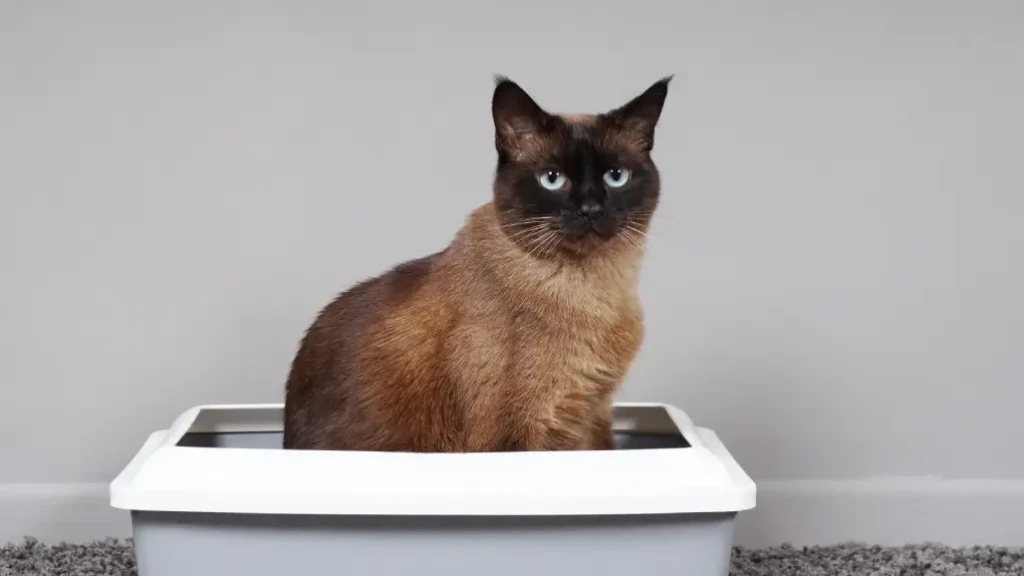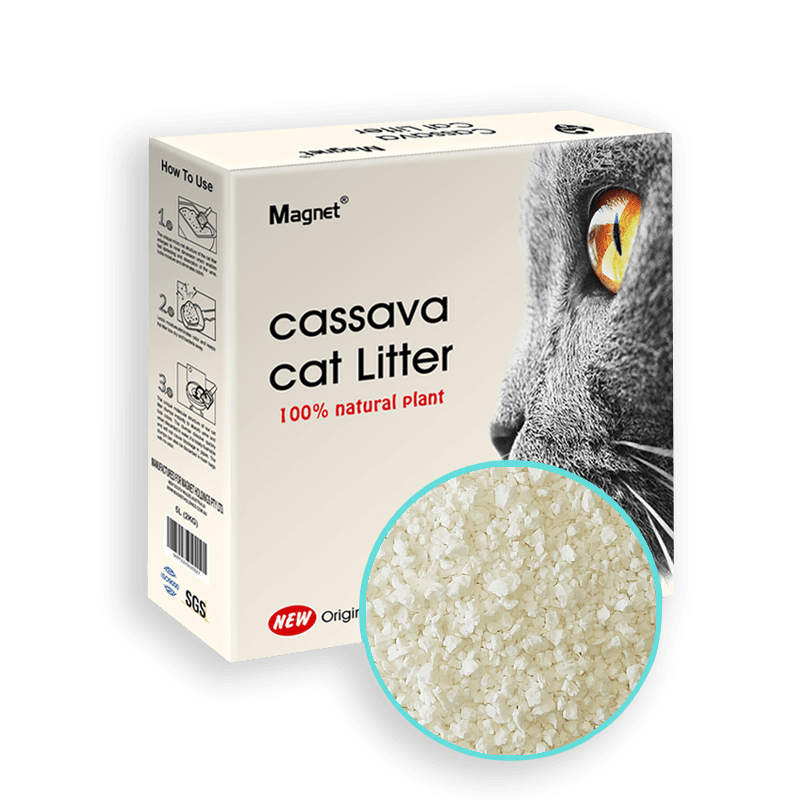Why is your cat spending more time in the litter box than usual? Cat sitting in litter tray can indicate various underlying issues, from simple health problems to more serious behavioral concerns.
In this post, we’ll delve into the common reasons behind this behavior and offer tips on how to address them.
Why Cat Sitting in Litter Box

While it’s not entirely normal for cats to lounge in their litter box, it can happen for several reasons. Here are seven potential explanations, each expanded upon:
1. Medical Issues
Urinary Tract Infections (UTIs), kidney disease, and digestive issues like constipation or diarrhea can cause discomfort and frequent visits to the litter box. Cats with UTIs may strain to urinate or cry out in pain. Kidney disease can affect a cat’s ability to produce and concentrate urine, leading to increased frequency and urgency.
Digestive issues can make it difficult for a cat to eliminate waste, leading to longer stays in the litter box. If you notice any changes in your cat’s urine or stool, or if they seem to be straining or in pain, consult a veterinarian immediately.
2. Cat Litter Problems
Cats can be quite particular about their litter. While switching litter types or brands might seem minor to you, it can upset your feline friend. A change in litter type, especially to a clumping variety, might cause your cat to spend more time exploring the new texture before using the box.
Even if the litter box is dirty, your cat might still spend more time in it. Instead of avoiding the mess, they might persist in searching for a clean spot to relieve themselves. Regular litter box cleaning is crucial to maintain a hygienic and inviting environment for your cat.
3. Cat Litter Box Issues
Cats are clean animals and prefer a clean litter box. If the litter box is dirty, your cat may avoid using it or spend more time in it trying to find a clean spot. It’s important to clean the litter box daily and change the litter completely at least once a week.
The type of litter you use can also affect your cat’s behavior. Some cats may be sensitive to certain types of litter, such as clay or pine. If you recently switched litter types, your cat may be adjusting to the new texture or smell.
The location of the litter box is also important. The box should be placed in a quiet, private location away from loud noises and high-traffic areas. It’s also important to provide enough litter boxes for the number of cats in your household. As a general rule, you should have one litter box per cat, plus one extra.
4. Environmental Changes
Introducing new pets or people into the home can stress your cat and lead to changes in their behavior, including increased time in the litter box.
Moving to a new home can be particularly stressful for cats, as they may associate the litter box with a sense of security. Home renovations, with their loud noises and disruptions, can also cause stress and anxiety, leading to changes in litter box behavior.
5. Behavioral Issues
Stress and anxiety can lead to changes in litter box behavior. Changes in the home environment, such as a new pet, moving, or a change in routine, can cause stress and anxiety. If your cat is stressed, they may urinate or defecate outside the litter box.
Territorial behavior can also lead to litter box problems. If there are multiple cats in the household, they may compete for resources, including the litter box. This can lead to one or more cats avoiding the litter box or urinating or defecating outside of it.
Attention-seeking behavior is another possible cause of litter box problems. Some cats may sit in the litter box to get attention from their owners. If you think your cat is doing this, try to ignore the behavior and reward your cat for using the litter box appropriately.
6. Pain or Discomfort
Another reason why your cat might be spending more time in the litter box is due to pain or discomfort. This can arise from various medical conditions, such as:
- Urinary Tract Infections (UTIs): These infections can cause pain and difficulty urinating, leading to longer litter box sessions.
- Constipation: Difficulty passing stool can be painful and frustrating for cats, causing them to spend more time straining in the litter box.
- Arthritis: Painful joints can make it difficult for older cats to get in and out of the litter box, leading to longer stays.
If you notice any signs of pain or discomfort, such as lethargy, decreased appetite, or changes in behavior, consult your veterinarian for a proper diagnosis and treatment.
7. Boredom
Just like humans, cats can experience boredom. While it might not be as obvious as a bored child pouting, boredom can lead to cat laying in the cat litter box for a long while.
Signs of Boredom in Cats:
- Increased Sleep: While cats are known for their long naps, excessive sleep can be a sign of boredom.
- Destructive Behavior: Bored cats may resort to destructive behaviors, such as scratching furniture, chewing on cables, or knocking things over.
- Overgrooming: Excessive grooming can lead to hair loss and skin irritation.
- Overeating: Boredom can lead to overeating, which can contribute to weight gain and health problems.
- Increased Vocalization: Meowing or howling excessively can be a sign of boredom or frustration.
- Lack of Interest in Play: If your cat is no longer interested in their favorite toys or playtime, it could be a sign of boredom.
8. Seeking Attention
Some cats may use the litter box as a way to get attention from their owners. If you suspect this is the case, try to ignore your cat when they are in the litter box and reward them with attention when they are engaging in other, more appropriate behaviors.
If you notice your cat spending more time in the litter box, it’s important to consult with your veterinarian to rule out any underlying medical issues. Your veterinarian can also provide guidance on how to address any behavioral or environmental factors that may be contributing to the problem.
Why is My Cat Lounging in the Litter Box
There are several reasons why your cat might be lounging in their litter box:
Medical Issues:
- Urinary Tract Infections (UTIs): UTIs can cause discomfort and frequent urination, leading to increased time in the litter box.
- Kidney Disease: Kidney problems can also affect a cat’s urinary habits and cause them to spend more time in the litter box.
- Constipation or Diarrhea: Digestive issues can make it difficult for a cat to eliminate waste, leading to longer stays in the litter box.
Litter Box Issues:
- Dirty Litter Box: Cats are very clean animals, and a dirty litter box can discourage them from using it.
- Litter Box Placement: If the litter box is in a noisy or high-traffic area, your cat may feel uncomfortable using it.
- Litter Type: Some cats prefer certain types of litter over others. If you’ve recently changed the litter type, it could be causing discomfort or dislike.
Environmental Changes:
- New Pets or People: Introducing new animals or people into the home can stress your cat and lead to changes in their behavior, including increased time in the litter box.
- Moving: Moving to a new home can be stressful for cats and may affect their litter box habits.
- Home Renovations: Loud noises and disruptions caused by home renovations can stress your cat and lead to changes in their behavior.
Behavioral Issues:
- Anxiety or Stress: Cats can experience anxiety or stress for various reasons, and the litter box can be a comforting place for them to retreat to.
- Marking Territory: Cats may use the litter box to mark their territory, especially if there are other cats in the household.
If you notice your cat spending more time in the litter box, it’s important to consult with your veterinarian to rule out any underlying medical issues. Your veterinarian can also provide guidance on how to address any behavioral or environmental factors that may be contributing to the problem.
How to Help Cat Sitting in Litter Box
If your cat is spending more time in the litter box than usual, it could be a sign of an underlying issue. Here are some steps you can take to help:
1. Consult Your Veterinarian
- Rule out medical conditions: A vet can check for potential health problems like urinary tract infections, kidney disease, or constipation.
- Get professional advice: Your vet can provide specific advice tailored to your cat’s situation.
2. Assess the Litter Box Environment
- Cleanliness: Clean the litter box daily and change the litter completely at least once a week.
- Litter Type: Experiment with different litter types to find one your cat prefers.1
- Box Size and Location: Ensure the box is large enough and placed in a quiet, private area.
- Multiple Boxes: Consider adding more boxes, especially for multi-cat households.
3. Address Behavioral Issues
- Stress and Anxiety: Identify and reduce stress factors, such as loud noises or changes in routine.2
- Territorial Behavior: Provide separate litter boxes for multiple cats.3
- Attention-Seeking Behavior: Avoid rewarding negative behaviors and provide positive reinforcement for using the litter box.4
4. Provide Environmental Enrichment
- Interactive Play: Engage in regular play sessions with your cat.
- Perches and Scratching Posts: Offer vertical spaces for climbing and scratching.5
- Puzzle Feeders: Stimulate your cat’s mind and encourage foraging behavior.6
5. Monitor Your Cat’s Behavior
- Observe: Pay attention to your cat’s behavior around the litter box.
- Note Changes: Keep track of any changes in their habits or signs of discomfort.
Remember: Consistent and patient approach is key. If you continue to have concerns, consult your veterinarian for further guidance.
By addressing the underlying causes and providing a clean, comfortable, and stimulating environment, you can help your cat overcome litter box issues and return to normal behavior.7
Conclusion
Cats are notoriously clean animals. So, when your feline friend starts spending more time in their litter box than usual, it’s a clear sign that something might be amiss. In this blog post, we’ve explored the common reasons why cats may exhibit this behavior, ranging from medical issues to environmental factors.
While we’ve covered the potential causes and solutions, one crucial factor often overlooked is the quality of litter. High-quality cat litter can significantly impact your cat’s litter box habits.
Consider upgrading to our premium wholesale cat litter. Our litter is designed to:
- Control Odor: Keep your home smelling fresh and clean.
- Provide Comfort: Offer a soft and hygienic environment for your cat.
- Promote Healthy Habits: Encourage regular and appropriate litter box use.
By investing in our premium cat litter, you’re not just providing a product; you’re investing in your cat’s well-being and your own peace of mind.
Ready to make a difference? Contact us today to learn more about our wholesale cat litter options and experience the benefits firsthand.









